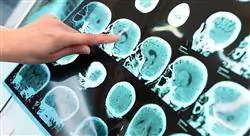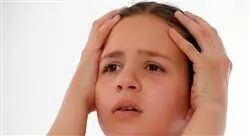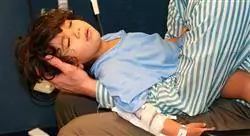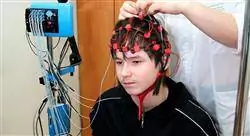University certificate
The world's largest faculty of medicine”
Description
The primary care pediatrician is a highly responsive specialist who solves more than 90% of the health demands of pediatric patients and their families. Their specialization is crucial in providing quality health care, and they must constantly update their knowledge in order to perform a quality praxis"
This postgraduate certificate in Neurology and Psychiatry Pediatrics is designed to review the concepts and procedures for the main glandular pathologies in children and adolescents, in order to establish the correct diagnosis and treatment, based on scientific evidence and the experience of recognized professionals in the field of Pediatrics.
It includes the main neurological and psychiatric pathologies, such as headaches, migraine, epilepsy, psychosomatic disorders, eating disorders, sleep disorders, or management of children with attention deficit hyperactivity disorder. The contents are approached with emphasis on the latest advances, so that professionals can update their knowledge and procedures, in order to provide quality care and improve the prognosis of pediatric patients.
This course will also be useful for those pediatricians who wish to update their knowledge and review action protocols, as it allows the specialist to learn first-hand about the most important advances in their usual clinical practice in primary care, keeping up to date with the new developments that appear every day in the discipline.
This postgraduate certificate in Neurology and Psychiatry Pediatricsill expand your professional capacity to deal with growth problems in children".
This postgraduate certificate in Neurology and Psychiatry Pediatrics contains the most complete and up-to-date scientific program on the market. The most important features of the program include:
- Clinical cases presented by experts in the different specialties. The graphic, schematic, and eminently practical contents with which they are created provide scientific and practical information on the disciplines that are essential for professional practice.
- New diagnostic and therapeutic developments and clinical practice guidelines on neurological and psychiatric pathologies in children.
- Presentation of practical workshops on procedures, diagnosis, and treatment techniques.
- Algorithm-based interactive learning system for decision-making in the presented clinical situations.
- All of this will be complemented by theoretical lessons, questions to the expert, debate forums on controversial topics, and individual reflection assignments.
- Content that is accessible from any fixed or portable device with an Internet connection.
This postgraduate certificate may be the best investment you can make in the selection of a refresher program for two reasons: in addition to updating your knowledge in Neurological Diseases and in the child, you will obtain a course degree from Neurology and Psychiatry Pediatrics."
Its teaching staff includes health professionals from the field of pediatrics, who contribute their work experience to this specialization, in addition to other specialists belonging to leading scientific societies.
The multimedia content developed with the latest educational technology will provide the professional with situated and contextual learning, i.e., a simulated environment that will provide immersive training program to train in real situations.
This program is designed around Problem Based Learning, whereby the physician must try to solve the different professional practice situations that arise during the course. This will be done with the help of an innovative interactive video system developed by renowned pediatric experts with extensive teaching experience.
This online methodology allows you, through clinical cases, to practice in a simulated environment and improve your performance skills."
Don't miss the opportunity to update your knowledge in neurological and psychiatric diseases to increase the quality of your care for pediatric patients and their families."
Objectives
The main goal of this program is to review the procedures in the approach to neurological and psychiatric pathologies in children, based on scientific evidence and the experience of renowned professionals in the field of Pediatrics.
This refresher program will generate a sense of security when practising medicine, which will help you grow both personally and professionally”
General Objective
- Update the procedures for the most frequent neurological and psychiatric pathologies seen in pediatric patients, for their correct diagnosis and treatment.
Specific Objectives
- Establish the basis for an adequate clinical history and physical examination of the pediatric patient with headache.
- Describe the usefulness of complementary tests in the diagnosis of headache.
- Define the main types of headache in childhood and their basic management.
- Define the concept of epilepsy, epileptic syndrome and epileptic seizures.
- Establish the paroxysmal phenomena that can mimic an epileptic seizure.
- Classifying epileptic seizures
- Describe the organization of epileptic or electroclinical syndromes during the neonatal period, infancy, childhood and adolescence-adulthood.
- Describe the specific constellations
- Establish the difference between idiopathic, symptomatic, provoked and cryptogenic epilepsies.
- Lay the foundation for the general treatment of epilepsies Define Attention Deficit Hyperactivity Disorder (ADHD).
- Developing the etiology of ADHD
- Develop the diagnostic criteria according to DSM-IV and the changes in DSM-5.
- Explain the basic algorithms of prefrontal dysfunctions on executive functions in children with ADHD.
- Define the basis for pharmacological treatment of ADHD and the importance of school support and psychoeducation.
- Define and classify Somatoform Disorders.
- Establish the phases of differential diagnosis in psychosomatic pathology.
- Describe the favoring or predisposing, precipitating and maintaining risk factors.
- Develop the diagnostic protocol of the etiology of psychosomatic pathology and the therapeutic approach.
- Define anorexia nervosa according to the Diagnostic and Statistical Manual of Mental Disorders, its classification and etiopathogenesis.
- Describe the warning signs and symptoms in the detection of Eating Disorders.
- Point out the criteria for hospital admission
- Define bulimia nervosa, its classification and etiopathogenesis.
- Define other eating disorders such as pica or rumination disorder.
- Describe and establish the differences between the phases of sleep: wakefulness, NREM and REM.
- List the main nerve centers related to the control of sleep and wakefulness.
- Explain the essential tools for the clinical evaluation of the patient with sleep disorders.
- Propose outlines for the use of questionnaires to support the diagnosis of sleep disorders.
- Define insomnia due to inadequate sleep hygiene and behavioral insomnia and the diagnostic criteria.
- Describe sleep hygiene measures, psychological interventions and pharmacological sleep treatment.
- Define restless legs syndrome (RLS), its clinical manifestations and diagnostic criteria.
- Define phase delay syndrome (PRS), its clinical manifestations and diagnostic criteria.
- Define sleep apnea-hypopnea syndrome (SAHS), its clinical manifestations and diagnostic criteria.
Take advantage of the opportunity and take the step to get up to date on the latest developments in cardiovascular and respiratory emergency care in the out-of-hospital setting.
Postgraduate Certificate in Neurology and Psychiatry Pediatrics
Psychological support during the diagnostic and treatment process in psychological diseases in children is a priority. Because it is necessary to have comprehensive care, it is essential that the medical specialist has the conceptual bases and protocols of action necessary to address the main neurological and psychiatric pathologies that manifest in their patients, always ensuring their safety and well-being. This requires that health professionals are updated in the latest methods and tools used in daily clinical practice in this field. For this reason, TECH Technological University designed this Postgraduate Certificate in Neurology and Psychiatry Pediatrics, a postgraduate course designed for Specialization in medical professionals in this area of knowledge.
Get a postgraduate degree on psychological diseases in the pediatric population
If one of your goals is to train you in the latest updates in scientific research, technology and therapeutic treatments of pediatric neurological and psychiatric diseases, as well as to take into account other factors that are involved with their diagnosis, in order to offer your patients the best available procedure, this program is for you. With this curriculum you will be able to review in detail the different signs, symptoms and characteristics of these conditions and develop diagnostic criteria that will allow you to detect their manifestation in time. Likewise, you will be able to define the basis for the treatment of your patient according to his or her individual needs, without losing sight of the importance of auxiliary assistance, such as school support and psychoeducation. In this way, you will be able to confidently and skillfully face the challenges that, as a health professional, will arise in your area of work.
Study at the largest digital university in the world
At TECH Technological University we recognize the impact that our students will have in today's world, in the lives of patients and in the area of knowledge of Pediatric Neurology and Psychiatry. Therefore, this course strives to provide a training that, in addition to offering an immersive theoretical and practical academic training, based on learning based on problem solving, encourages future specialists an ethical component to ensure individualized and high quality care for pediatric patients.











